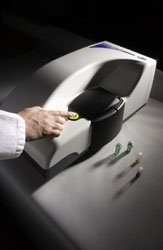Dr Martin Muschol, Assistant Professor at the University of South Florida's (USF) Department of Physics and his team are carrying out important research to gain a better understanding of protein aggregation phenomena, including protein crystallization and amyloid fibril growth. Using the Zetasizer Nano ZS, from Malvern Panalytical (Malvern Panalytical, UK), the USF researchers have been able to perform temperature controlled static and dynamic light scattering (DLS) measurements of protein hydration, protein interactions and aggregation kinetics in vitro.

"By enabling temperature controlled measurements, the Zetasizer Nano ZS is particularly suited to our work here at USF," said Dr Muschol. "With it we have been able to monitor the effect on the hydration of proteins by salt ions in solution, measuring the hydrodynamic radius of proteins down to plus/minus one tenth the diameter of a water molecule. Interestingly we found that neither chaotropic or cosmotropic salt ions affected overall protein hydration up to salt concentrations of 1M." (ref: 'Hydration and Hydrodynamic Interactions of Lysozyme: Effects of Chaotropic versus Kosmotropic Ions', Biophysical Journal, Volume 96, pp 3781-3790)
Having published several papers in the past year alone, data gathered by Dr Muschol and his team will be used to develop models for protein fibril formation, a behaviour thought to trigger degenerative diseases, such as Alzheimer's disease or Parkinson's disease. "Despite intensive research efforts, we still don't understand how proteins can stay in solution in a crowded cellular environment and what triggers their aggregation and subsequent pathological changes. We hope our research will contribute to resolving these basic puzzles." (ref: 'Amyloid Protofibrils of Lysozyme Nucleate and Grow Via Oligomer Fusion', Biophysical Journal, Volume 97, pp 590-598)
Dr Muschol's team has also had noticeable success in using the Zetasizer Nano ZS to study the nucleation of gold nanoparticles (ref: R. Jagannathan, et al. J. Phys. Chem. C, 2009, 113, pp3478-3486). Unlike static light measurements commonly used to detect nucleation events, DLS separates out the background scattering from small molecular species in gold sols. Therefore, DLS was able to detect nucleation at a significantly earlier stage than has been possible with other approaches.
The Zetasizer Nano ZS is proving to be the ultimate sizing solution for biotechnology and materials scientists, offering exceptional sensitivity down to sub-micron and nanometre scales. The system's ability to control temperature is important when following the behaviour of polymers and protein samples. Further information can be found at www.malvern.com/zetasizer
Malvern Panalytical, Malvern Panalytical and Zetasizer are registered trademarks of Malvern Panalytical